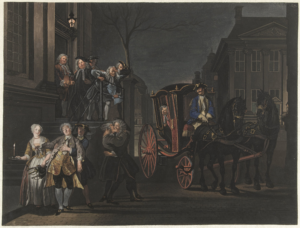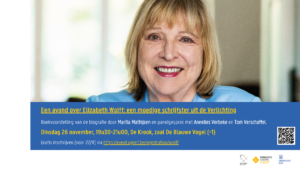Report
Medieval and Early Modern Studies Spring School 2024
Landscape History & Ecology (27-31 May, Ghent)
Estel van den Berg
DAY 1:
On the 27th of May we gathered at the STAM museum in Ghent for the exhibition ‘Ghent’s Lands’, on the rich history of the city of Ghent’s agricultural lands from the 12th century to the present. It was a promising start of a week with lectures, seminars and workshops concerning Landscape History and Ecology from an interdisciplinary perspective. We were welcomed by organisers Kornee van der Haven and Caroline Baetens, after which we were guided by Esther Beeckaert of the STAM museum through the exhibition. The exhibition concerned the relation between institutions managing Ghent’s agricultural lands and the farmers renting those lands. It showed how that relationship between farmer and institution evolved from the hospitals of the Middle Ages and early modern period to the present management of the lands by the Public Centre for Social Welfare of Ghent (OCMW). The exhibition ended with touching video testimonies of farmers whose livelihood had been threatened by the selling of the agricultural lands by the OCMW to fund the cities’ social services, installing a sense of urgency in the viewer. The exhibition left us with questions on the future of Ghent’s agricultural landscape and the role these lands could play in the climate change transition.
This visit was followed by a bike tour through Ghent and its surroundings, as we cycled along the river Leie to different farmlands and green initiatives outside the city. One of the green farms we visited was managed by farmers from the CSA, the Community Shared Agriculture, who focus on ecological products locally produced and distributed. We also visited the farm of dairy farmer whose video testimonial was part of the exhibition, who is currently using his lands he rents from the OCMW to transition to a biological, eco-friendly farm. The rich history of local lands and their relevance to present day ecological sustainability challenges set the standard for the rest of the week.
DAY 2:
The Spring School lectures were hosted at the venue Het Rustpunt, a former Carmelite cloister with a beautiful garden in the city centre, inviting us to reflect on human interaction with nature in the city. The day started with a lecture by Prof. Tim Soens of the University of Antwerpen on the history of wetlands, water meadows and traditional irrigation method. He presented our changing relationship with rivers and wetlands from the Middle Ages to the present. Doing so, he challenged the term ‘fluvial Anthropocene,’ as it implies that humans are in control of the rivers, which proved to be an illusion, especially considering the floods of July 2021. He argued in favour of amphibious strategies when concerning the interaction between humans and rivers and re-connecting humans with the rivers and wetlands. This goes against the narrative stemming from early modernity of water as an enemy that should be conquered. At the same time, he warned us to not look at the past too favourably concerning sustainability, naming peat extraction of over-exerting the land in the Middle Ages.
In the afternoon, Prof. Iason Jongepier (Antwerp University) gave a workshop on cartography with the application QGIS. QGIS allows users to track large scale landscape changes by overlapping maps. During the workshop, we mapped changes in the landscape in Zeelandic Flanders and saw what lands were taken by the sea and which were developed. After the workshop, Arjan van Dalfsen, Silvio (Laurenzo) Ruberto, Julia Kantelberg, and Lotte Christiaans presented their research in a short pitch, after which they received feedback from both students and professors. Arjan van Dalfsen presented his PhD-project on using AI to find plants and animals in Dutch texts, creating a textscape; a world that emerges from texts. He visualised his research in a racing bar chart and presented current obstacles and future challenges for his digital approaches. Laurenzo Ruberto proposed the use of GIS (geographical information systems)-based least-cost-path analysis to argued for a narrative of continuity of the spatial-administrative organisation of the island of Sicily, despite the island’s many regime changes. Conservator Julia Kantelberg presented her preliminary ideas for an exhibition on changing landscape at the Rijksmuseum Amsterdam, asking participants of the Spring School what narratives and/or objects should be included in such an exhibition. Lotte Christiaans proposed to research the Bouwshift from a feminist political-ecological framework, taking inspiration from Matters of Care by Maria Puig de la Bellacasa.
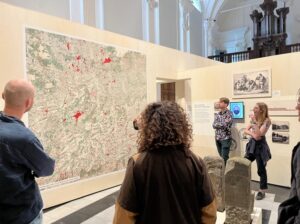
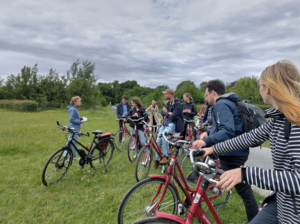
DAY 3:
In the morning, we left for our excursion to the Zwin Region, where we visited the Zwin Nature Park. In the Visitor’s centre, Prof. Wim De Clercq (Ghent University), supervisor of the project ‘High tide low, tide: The late-medieval harbour of Bruges as a maritime-cultural landscape,’ presented the history of the region and the connection with the late-medieval harbour of Bruges. He also reflected on the importance of multidisciplinary cooperation to realise an ambitious project like this, as well as the ways in which the project catered for a broader audience to get in contact with the history of the landscape in the Zwin Region. After the presentation, Pieter-Jan Reynaert and Joris Kingma pitched their research. Jorris Kingma presented his research on sea dyke construction in Frisia in the eleventh century. His approach was rooted in the history of mentality and connected well with the presentation by De Clercq, especially his cultural history analysis of a region which is neither sea nor land. Pieter-Jan Reynaert’s pitch concerned the ‘Desertification of Flanders,’ where he delved into the historical origins of the drainage of the Campine area, asking questions for the future of this area while looking at past interventions in the landscape. The visit to the Zwin Region ended with a visit to the observation centre and a short walk into the nature park.
In the afternoon we ventured to Axel, where we were welcomed by Willemieke Ottens (Groningen University) in museum Warenhuis for a lecture on landscape representation and cultivation at Dutch country houses in Holland and in the Veluwe region. She argued for an interdisciplinary approach towards the history of country houses, as her research is at the intersection of cultural history, landscape history and art history. During the break, we visited the exhibition Fresh from the garden in the Warenhuis museum, which was organized by Caroline Baetens in collaboration with the museum. After the break, Floris van Alebeek, Sanne Steen and Cécile Bruyet presented their research, connecting it to the exhibition and Otten’s presentation by discussing gardens, orchards and landscape art. Floris van Alebeek pitched the vision behind the exhibition Veranderland in the Noordbrabant Museum on landscape art, suggesting that the ‘Twit Principle’, after Roald Dahl’s The Twits, might be a useful metaphor to understand our relationship with everchanging landscape. Sanne Steen presented her research on Erasmus’ relationship with gardens and gardening in the Adagia and the Colloquia, arguing that Erasmus uses gardening as a metaphor for the interpretation of scripture. Cécile Bruyet presented us with the example of the orchard of Willem Peters in the late 15th century and the many uses such an orchard had for late medieval city dwellers: commercialisation, food security and household provisioning, and social distinction.
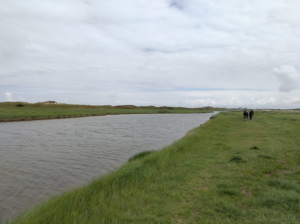
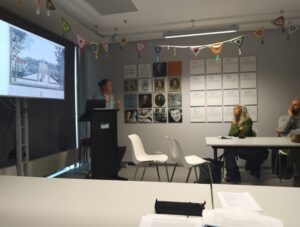
DAY 4:
We started our day with a workshop on nature writing, taught by Dr. Femke Kramer (Groningen University). We began with an orientation exercise in which we were to locate the north, the nearest body of water, and the nearest animals, wild and domesticate. This caused us to connect our perception of the landscape better to our own personal experience. Taking inspiration from the ancient concept of enargia (vividness and visual immediacy), we each wrote a short story on our preferred garden, region or landscape, by using concrete, precise, ‘particularising’ language. After the exercise, we presented our writing exercises to each other in the garden of Het Rustpunt.
After lunch, we walked to the Special Collections of the University Library for the lecture by Dr. Joana van de Löcht (Freiburg University) on the representation of nature and its order in the print culture of the early modern period. Using books from the collection of Ghent University, she guided us through centuries of nature representations and changing attitudes towards nature. After a brief break in which we inspected the encyclopaedic early modern nature books, Caroline Baetens presented on the arboreal virality and intellect in the garden poem by Jacob Cats using the concepts ecophobia and ecophilia. Finally, Mart Rewinkel pitched on the representation of Dutch ‘mountains’ on maps, arguing that our perception of mountains is culturally determined.

DAY 5
The final day of the Spring School started with the lecture by Dr. Marrigje Paijmans (University of Amsterdam) on the relation between economy and ecology in the context of colonial Surinam. Applying theories concerning ecological personhood to literary texts, Paijmans investigates a history of violence and resistance in the former Dutch colony. Using the concept of minoritairian identities from Monique Allewaert’s Ariel’s Ecology, where enslaved people become one with the environment to resist European colonisation, Paijmans showed how Surinamese authors covetly criticized the Dutch using animal metaphors. The following lecture of Thijs Lambrecht (Ghent University) concerned the classification of animals as ‘vermin,’ depending on their relation to humans. Inspired by the changing behaviour of animals during the covid pandemic, he demonstrated how economic changes change the ‘landscape of fear’ of animals, using bounties put on animals as examples.
The final pitches of the Spring School were given by Hannah Heath, Johan Visser, Estel van den Berg and Seb Verlinden. Hannah presented on ecotourism, extractivism and wildlife conversation and the history of nature parks in South Africa. She showed how the commodification of animals due to the colonial mindset of the Dutch and the English affected the animal population. Analysing Otto Keyes propagandistic colonial work Het waere onderscheyt tusschen warme en koude landen (1659), Johan pitched that hunger and food provisioning in the colonies were heavily influenced by the culture of the Dutch colonisers. Estel van den Berg presentation on imagined colonial landscapes in the early modern comedy de Theezieke juffers (1702) demonstrated that colonial landscapes were imagined as a cornucopia, or lands of abundance, in part due to the immense distance between the Dutch households, the oikos, and the VOC trading posts. Seb Verlinden pitched on the difference in representation of ‘verminous,’ unwanted water of the swamps and the favoured fertile water of the floodplains in the Campine. He questioned the validity of such a distinction using agronomic literature from the 18th and 19th centuries as his source, also regarding the future of the drainage system in the Campine region.
After the final round of feedback from all participant’s, the 2024 Spring School Landscape history and ecology came to an end. We look back on a very lively spring school with a lot of discussion and mutual feedback from the participants, as well as a inspiring dialogue between very diverse scholarly disciplines, ranging from archaeology, historical geography, philosophy, literary studies, cultural history, to urban studies.
The Spring School is part of the Doctoral Schools UGent programme and organised by members of the UGent Group for Early Modern Studies & Pirenne Institute, Groningen Research Institute for the Study of Culture (Rijksuniversiteit Groningen), Huizinga Institute (Dutch Graduate School for Cultural History) & Dutch Graduate School for Medieval Studies, the Centre for Urban History (UAntwerpen) and Agricola School (Groningen). We would also like to thank the other partners from both Flanders and the Netherlands that supported this initiative: Amsterdam Centre for Studies in Early Modernity (University of Amsterdam), Institute for Early Modern History (UGent-VUB) and Onderzoeksgroep Nieuwe Tijd (KU Leuven).
Organisation: Caroline Baetens, Femke Kramer, Stefan Meysman, Marrigje Paijmans, Jeroen Puttevils, Hanneke Ronnes and Kornee van der Haven.

